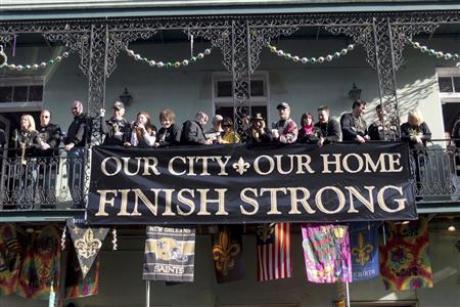

 |
|
An undated publicity photograph from director Spike Lee's new film ''If God is Willing and Da Creek Don't Rise'', a two-part, four-hour documentary on New Orleans and the Gulf coast which will debut on the HBO network on August 23, 2010, just days before the fifth anniversary of Hurricane Katrina that killed more than 1,800 people, caused billions of dollars of damage to the Gulf coast. The film is a sequel to ''When the Levees Broke: A Requiem in Four Acts'', a 2006 film showered with awards and praised for the raw drama of its depiction of the storm and its aftermath. [Photo/Agencies] |
Five years ago, Hurricane Katrina swept infants out of their mothers' arms, filled whole neighborhoods with dirty water, flooded schools and hospitals and turned New Orleans into a byword for disaster.
What happened next?
The question is at the heart of Emmy Award-winner Spike Lee's new film "If God is Willing and Da Creek Don't Rise", a two-part, four-hour documentary on New Orleans and the Gulf coast set to haunting music.
It will debut on the HBO network on August 23 and 24, just days before the fifth anniversary of the storm that killed more than 1,800 people, caused billions of dollars of damage to the Gulf coast and tarred President George W. Bush with accusations of failure to mount a swift rescue effort.
The film is a sequel to "When the Levees Broke: A Requiem in Four Acts", a 2006 film showered with awards and praised for the raw drama of its depiction of the storm and its aftermath.
"The story wasn't done at the end of "When the Levees Broke" and the story's still not done at the end of "If God is Willing and Da Creek Don't Rise," Lee told Reuters.
"We wanted (the second film) to continue the story, which is a great part of America's history," he said.
Lee, an Academy Award nominee, is famous for movies such as "Do the Right Thing" about race relations in America and for characters whose dialogue is so sharp it sounds like it could not have been scripted in advance.
A theme that emerges in the second film is how victims of the storm have overcome their pain to build better lives.
One woman displaced to rural Utah by the storm wrestles with her dislocation from New Orleans, the city of her birth.
A mother whose five-year-old daughter drowned when the city flooded is now training as a nurse. But the new life she builds for herself and her sons is lived in the shadow of what happened.
"People are just trying to survive, trying to get by, trying to get their lives back in order. Some people have made more progress than others," Lee said.
SUPERBOWL, OIL SPILL
Yet the film's ambition is not simply to show individual struggle but to set events in New Orleans in a historical context.
One section makes a comparison between New Orleans and Haiti after its January earthquake, following actor Sean Penn's philanthropic efforts on the Gulf coast and in Port-au-Prince, the Haitian capital.
"If God is Willing" also focuses on three recent events to pinpoint how the city has moved on: the election of mayor Mitch Landrieu, the Saints victory at the 2010 National Football League Super Bowl and, most of all, the Gulf oil spill.
Lee began filming in February and wrapped production before April 20, when an explosion and fire on a BP Plc rig in the Gulf of Mexico triggered the worst oil spill in U.S. history. He said the spill forced him to "reconfigure everything".
New Orleans is the home to many companies involved in offshore drilling and the Gulf coast south of the city is home to a multi-billion dollar seafood industry.
"People are still angry (about the storm). But the anger (over the spill) is directed mostly at BP. People are furious at BP," Lee said.
By contrast, "When the Levees Broke" crystallized the rage of citizens toward the federal government. Michael Brown, who was vilified in the first film as the inept head of the Federal Emergency Management Agency, makes a surprising appearance in "If God is Willing" to defend his record.
Lee said Brown was wrongly made a "scapegoat" for the government's poor response to the storm.
The director added that the election of Barack Obama as president in 2008 had not changed America fundamentally when it comes to race.
"Race in the country has not changed just because Obama is in the White House. It's that simple," Lee said.